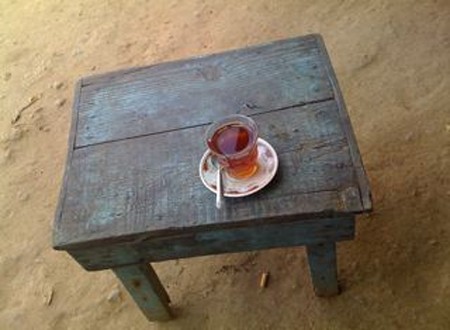Spinoza und der Fisch
Radio art
2011
Catalogue number : 35
In October of 2010 I was in Eritrea tracking the sonorous remains of the Italian presence. I was following the footsteps left by the colonial paw In this remote and little known mountainous state in East Africa.
My hears, attentive to languages, were looking for the debris of the Italian idiom, my mother tongue, that up to now, are still mixing with the Tigrinya, the local and complex Semitic language. There are still many Italian words in this language, loose and scattered like shells or pieces of rounded glass mixing with sand on a shore. Eritreans have chewed those words as candies long enough to give them another shape.
The coperta (blanket ) becomes “kobortá”, the bicicletta (bycicle) becomes “schigetta” and the chewing gum goes straight from gomma da masticare to “mastica” and those are just a few from a long list.
I actually found a lot more in Eritrea and I experienced the unique sensation of floating in an incongruous flashbacks. It felt as if many animated postcards would have been sent to me from an indefinite italian time between the fascist twenties and the seventies.The architecture of Asmara and Massawa tell a story. And so do the suits that old men wear, their bar etiquette and body language, the food, the pizza, the lasagna, the first and family names.
All this and much more tells a story that in Italy has been widely forgotten. The facial features tell the stories of the left behind children that Italians in the colonies had by their second and temporary Eritrean wives. They called them the madame.
The asmarini tell the story of those stubborn Italians of Eritrea who insisted to remain even after the country passed under British rule, after Ethiopia took over and even after Menghitsu’s dictatorship.Asmara was literally half italian till the seventies, a city of seven hundred thousand people. They felt home.
What did my microphone captured ?A dream, a surreal and solitary journey.
It is narrated by the alter-ego optician and philosopher Benedetto Spinoza dazed and out of place in the heat of the Horn of Africa.Spinoza is a moody and casual alter-ego chosen for the sole reason that during my stay in Asmara I had enough off time to read his ethics and his biography written by Steven Nadler.
Spinoza was for me a borrowed pair of eyes (or spectacles) through which I could observe Eritrea with a little more detachment.
It looked like a far away country, isolated, poor and secret and still so familiar.
« Esperienza Italia », unter diesem Motto feiert Italien 2011 sein 150-jähriges Bestehen. Grund genug für den Klangkünstler Alessandro Bosetti, eine Reise in die Vergangenheit seiner Heimat zu unternehmen. Sein « Erlebnis Italien » findet Bosetti allerdings nicht in Rom, Turin oder Mailand, sondern in Eritrea.
Die ehemalige Kolonie in Ostafrika wirkt auf ihn wie ein konserviertes Italien der Vorkriegszeit.
Sprache und Kultur der verschwundenen Invasoren liegen wie ein undurchsichtiger Nebel über dem Land. Mit Hilfe des zufällig anwesenden Optikers Benedetto Spinoza wird Bosettis Mikrofon zu einer Linse für die Zeit.
« Italien ist Stillstand. Eritrea ist Stillstand. Sie kreisen umeinander. Sie spiegeln sich gegenseitig. » (Bosetti)
A Deutschland Radio Kultur production 2011.
Recorded on location, Asmara / Massawa Eritrea, 2010.
With the voices of Fernanda Farah (German version), Federica Fracassi (italian version).
Duration : 48’40″
